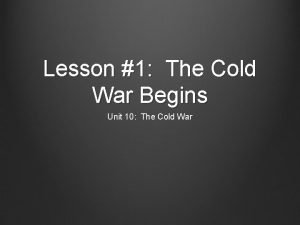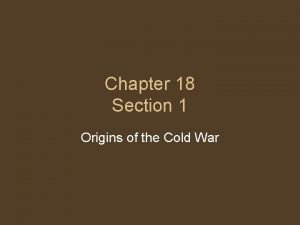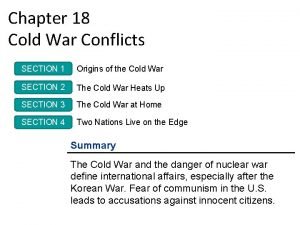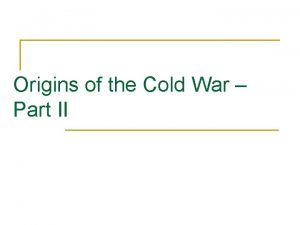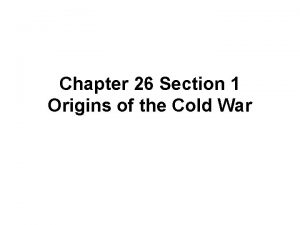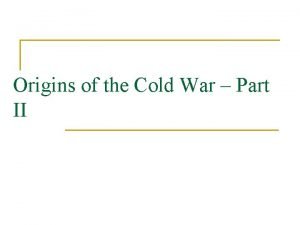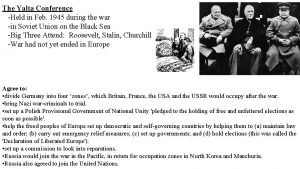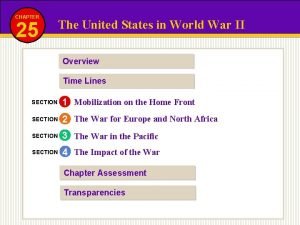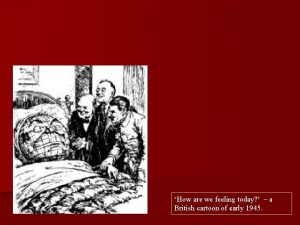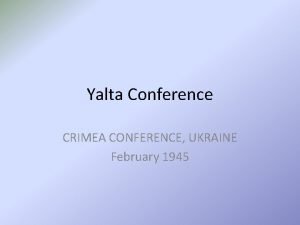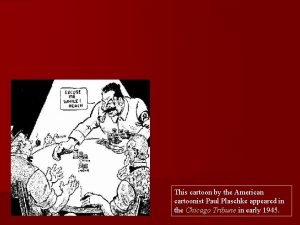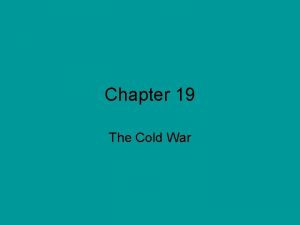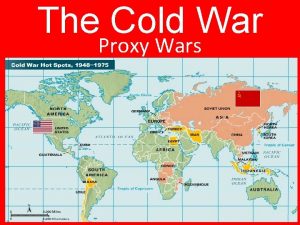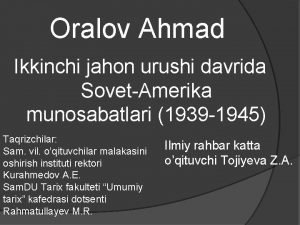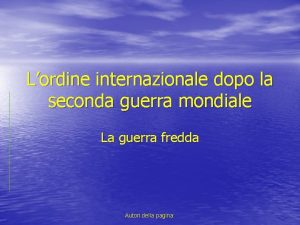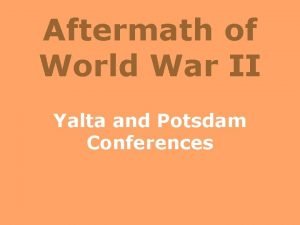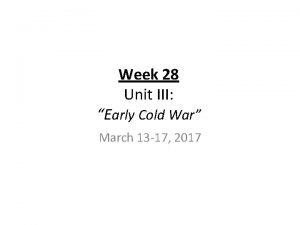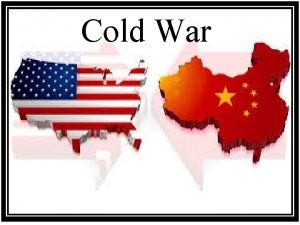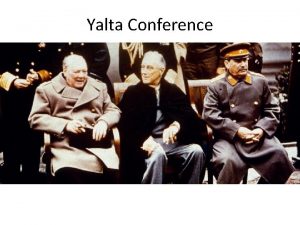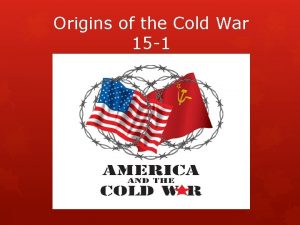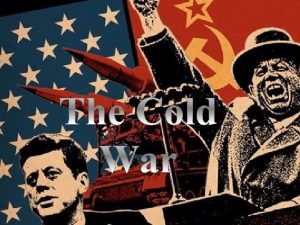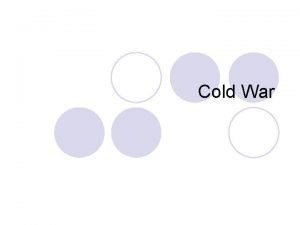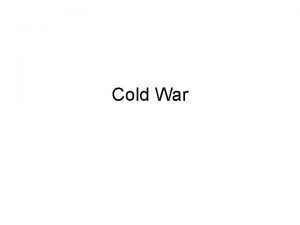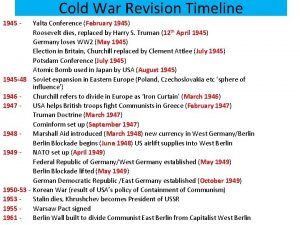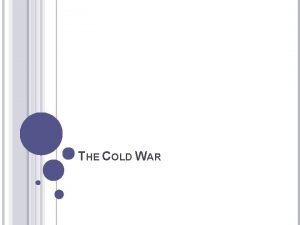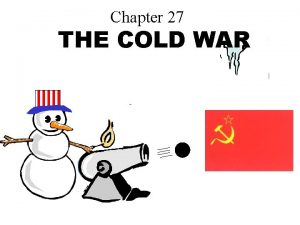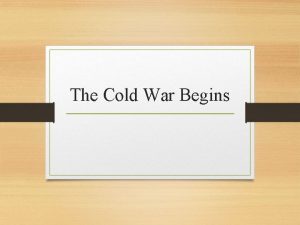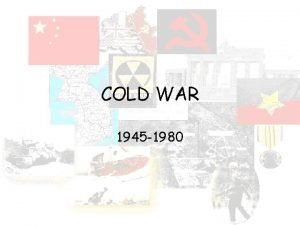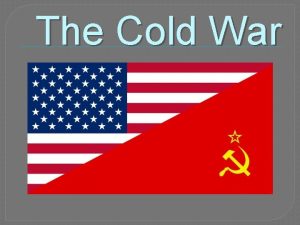Origins of the Cold War The Yalta Conference



















- Slides: 19

Origins of the Cold War

The Yalta Conference: �Roosevelt, Churchill, and Stalin met at Yalta to discuss Poland, Germany, and the rights of liberated Europe. �February 1945 �Yalta is a Soviet Resort on the Black Sea �Planned postwar world �Several agreements reached at Yalta played an important role in causing the Cold War

Outcomes 1. Poland: Two governments were claiming the right to Poland – communist and anti-communist Stalin wants: Polish government to be friendly with Soviet Union Roosevelt and Churchill want: Poland to be free and sovereign COMPROMISE: Polish government set up by Soviets, would include members of pre-war Polish government, free elections would be held as soon as possible

Outcomes 2. Declaration of Liberated Europe “the right of all people to choose the form of government under which they will live” PROMISES THE FOLLOWING 1. People of Europe could create democratic institutions of their choice 2. While people are deciding, temporary governments would be set up that represented all democratic elements 3. Final governments will be established through free elections

OUTCOMES: Dividing Germany: Country split into four zones (between Great Britain, France, U. S. , and Soviets) Berlin: Also divided into four zones Stalin: Wants Germany to pay COMPROMISE: Germans could pay with trade goods instead of cash; did not resolve issue…

Tensions Begin to Rise � 2 weeks after Yalta, Soviets pressure Romanian King into creating communist government �US accuses Soviets of violating the DLE �Soviets let no more than 3 non-communist Poles to serve in 18 member Polish government �No indication Soviets were going to hold free elections in Poland �April 1, President Roosevelt informs Soviets their actions are not acceptable

Ironic

With a partner. . . complete the chart Communism Capitalism

Americans focused on: �Economic Problems Soviets focused on: �Securing their borders �Remember – USSR got brutally destroyed during much of WWII. . . never again wanted that to happen

Here’s what the U. S. believed 1. Depression had caused WWII - Hitler would never come to power Japan would not have wanted to expand its empire 2. Economic growth was the key to peace - When nations stop trading, they are forced into war to get resources

Americans begin promoting democracy and free enterprise A. Believed that protections for people’s rights made countries more stable and peaceful B. Free enterprise system, with private property rights limited government intervention in the economy (best route to prosperity)

Truman Takes Control: �Roosevelt dies 11 days after confronting Soviets on Poland �Truman is anti-communist �Believed the war had been started because Britain appeased Hitler �“We must stand up to the Russians” �Truman told a Soviet Foreign minister that Stalin must hold free elections as he promised �The meeting marked an important shift in Soviet. American relations

The Potsdam Conference �TRUMAN: Takes a firm stand against heavy German reparations Suggests Soviets take reparations from their zone, Allies would allow industry to revive in their zone

The Potsdam Conference �STALIN Force Germany to pay reparations or allow the Soviet Union to confiscate industrial infrastructure Allows the Soviet Union to take industrial materials from the more industrial Western Germany

The Potsdam Conference �OUTCOMES Tensions are at the highest. The Atomic Bomb exchange creates the root of the tensions between the Soviets and America

Read Excerpts on Stalin and Truman � 2 volunteers to read aloud �Blue book

The Iron Curtain Descends: � Truman won argument over reparations, but little else Soviets say: � Refuse to make any more commitments to the Declaration of Liberated Europe � Presence of Soviet army in Eastern Europe ensures pro-Soviet communist governments to be set up in Poland, Romania, Bulgaria, Hungary, Czech � These nations become known as the satellite nations These nations had to remain Communist and friendly to the Soviet Union � Winston Churchill coined the phrase Iron curtain falling across Europe: speech in 1946 in Fulton, Missouri � Iron Curtain refers to the communist nations of Eastern Europe and the Soviet Union � With the Iron Curtain separating the Communist nations of Eastern Europe from the West, the WWII era had come to an end. The Cold War was about to begin.


Truman Doctrine & Marshall Plan �https: //www. youtube. com/watch? v=Xyoviiavusk
 The cold war lesson 1
The cold war lesson 1 Origins of the cold war chapter 18 section 1
Origins of the cold war chapter 18 section 1 Origins of the cold war chapter 18 section 1
Origins of the cold war chapter 18 section 1 Origins of the cold war
Origins of the cold war Chapter 26 section 1 origins of the cold war
Chapter 26 section 1 origins of the cold war Origins of the cold war
Origins of the cold war Yalta conference definition
Yalta conference definition Yalta conference agreements
Yalta conference agreements What did the “big 3” decide at the yalta conference?
What did the “big 3” decide at the yalta conference? And how are we feeling today cartoon
And how are we feeling today cartoon Yalta conference agreements
Yalta conference agreements Excuse me while i reach political cartoon meaning
Excuse me while i reach political cartoon meaning Cold war conference
Cold war conference Proxy wars in the cold war
Proxy wars in the cold war Oh my yalta
Oh my yalta Tehron konferensiyasi
Tehron konferensiyasi Yalta cartina
Yalta cartina As a result of the yalta and potsdam conferences, ________.
As a result of the yalta and potsdam conferences, ________. Cold war
Cold war Communist and capitalist countries cold war
Communist and capitalist countries cold war
